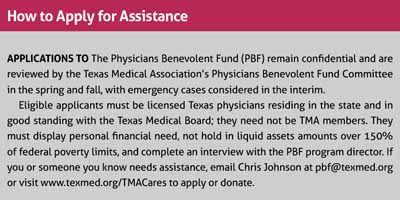
Marie Haeffner-Reeves is used to painting a picture.
As a watercolor artist, Mrs. Haeffner-Reeves is often found painting memories into life at her home in Houston, drawing inspiration from what she loves: Texas architecture; the mountains; and her late husband, William Reeves, MD.
Those who knew the Reeveses would assume she was the artistic one, but Dr. Reeves was an artist in his own right, too. He had an appreciation for photography and medicine, interests both spurred by his love for people. Although medicine was the passion he pursued professionally, he never stopped taking pictures, and encouraged his wife to join him.
When Dr. Reeves began experiencing heart problems in 2006, the couple continued their artistic endeavors, albeit not as much. To focus on his health, Dr. Reeves left his role as a primary care physician at The University of Texas MD Anderson Cancer Center, a difficult move having been in practice for 20 years. Shortly thereafter, the Reeveses were hit with financial difficulties. To stay afloat, they turned to the Texas Medical Association's Physicians Benevolent Fund (PBF), which they’d heard of through the medical grapevine.
This, Mrs. Haeffner-Reeves says, is when it became easier to focus on the big picture.
“When TMA started helping us in 2006, it was really lifesaving,” Mrs. Haeffner-Reeves said. “They came through for us, especially for my husband, who was such a people person. It was so good that he had that kind of support from within the medical community. I think it helped him keep going when otherwise he might have been in despair.”

PBF was created in 1961 by past TMA President May Owen, MD, to financially support Texas physicians and their immediate families during times of hardship, such as injury, decline, and disability. Over the next six decades, the program grew to include two additional funds under the umbrella of the PBF Family of Assistance Funds, adding to its list of services financial support for treatment for impairing conditions and natural disaster aid for physician practices.
For six months, the fund supported the Reeveses until Dr. Reeves returned to work. Four years later, financial strain and Dr. Reeves’ eventual cancer diagnosis led the couple to reapply. Through PBF, physician families like the Reeveses can receive assistance necessary to stay on top of personal expenses like rent, mortgage, utilities, and health care bills.
When Dr. Reeves died in 2017, Mrs. Haeffner-Reeves remained a recipient of the fund, which also aids physicians’ spouses who have become widowed. Without the support, she would have lost her Houston apartment.
For her, the support was both financial and emotional.
“I’ve had a relationship with PBF [staff] for many years,” Mrs. Haeffner-Reeves said, recalling moments of support from PBF Associate Vice President Gail Schatte and Director Chris Johnson.
“Before the pandemic, Chris and Gail would come and visit us. When my husband’s health would decline, I would call and talk to Chris, who was incredibly supportive and showed a concern and care for us. The help we received was financial and personal.”
Ms. Johnson says that building a connection with recipients is instrumental to being a good steward of the fund.
“We want to make sure recipients get what they need, and not only financially,” she said. “We build great relationships with our recipients and applicants, and we have this special bond. We want to support them as much as we can because we know they need the help.”
That support has taken many forms over the years, from offering a listening ear to helping beneficiaries with grocery shopping. During home visits, Ms. Johnson and Ms. Schatte provide encouragement some recipients desperately need.
“We often sit with people who cry through the whole meeting,” Ms. Schatte said. “Their situations can be tough. We try to process all the information, all the emotions, because in essence, they are transferring all their need on us. … We leave there carrying all that they need.”
For medical professionals used to providing care instead of receiving it, at times the greatest burden can be asking for help. A friend or colleague can refer a physician who is hesitant to apply, which ensures qualified applicants receive assistance quickly and confidentially. Protecting the anonymity of fund applicants and recipients is top priority for TMA.
Although physicians may be reluctant to apply, TMA Vice Speaker John Flores, MD, who since 2021 has served on the PBF committee that reviews applications, reminds them the fund is there to help in a confidential manner, and he encourages them to change their perspective.
“We [physicians] are trained in a culture where we are the ultimate decision-makers. We have to realize it is not a failure to be the one in need of help,” he said. “Physicians might think they’ll be fine, but that’s not the case for everybody. Some physicians struggle. The ones I’ve seen who’ve had a need don’t always foresee it.”
Mrs. Haeffner-Reeves remembers when her husband was part of that group. Nowadays, the Texas artist honors her husband’s memory by encouraging others to use the fund.
“The thing is, anyone can be faced with a change in fortune,” Mrs. Haeffner-Reeves said, “and when you are, you really don’t have but two choices: to withdraw or to reach out for help. If you do find yourself in that position, you’d be really surprised what difference help can make.”